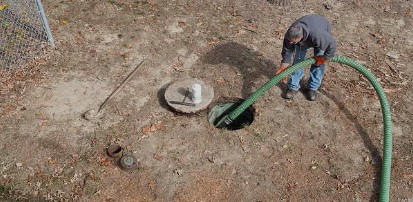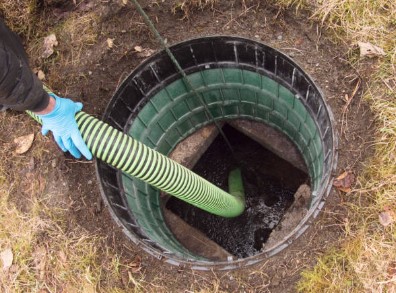
A septic tank is a pivotal piece of a home’s waste removal system. It’s answerable for securely managing and breaking down the wastewater from your household. Be that as it may, there are times when a foul odor reminiscent of a Septic Tank Smell in The House During Heavy Rain becomes observable, especially during heavy rain. This issue can be an irritation, yet understanding the causes and solutions can assist you with maintaining a new and odor-free home.

The Causes of Septic Tank Smell In House During Heavy Rain:
Leaking Septic Tank:
One of the essential explanations behind a Septic Tank Smell in The House During Heavy Rain is a leaking septic tank. The overabundance of water from heavy rain can seep into the ground and infiltrate your septic tank, causing it to overflow. This overflow can convey foul-smelling gases and waste once more into your plumbing system, resulting in an unpleasant odor in your house.
A leaking septic tank is a typical issue that emerges when the tank’s structural integrity is compromised. Cracks, fractures, or deteriorated components can permit rainwater to successfully infiltrate the tank, overwhelming its ability to deal with wastewater. This influx of water dilutes the sewage inside the tank and can disrupt the microbial balance liable for waste decomposition.
Damaged or Blocked Drain field:
A septic system includes a drain field, which is liable for filtering and dispersing treated wastewater into the ground. During heavy rain, the drain field can become inundated, causing it to clog or damage. When the drain field malfunctions, it can disrupt the appropriate wastewater flow, leading to sewage smells permeating your home. The drain field is a basic component of the septic system, where the clarified wastewater is disseminated and generally separated into the soil.
Notwithstanding, heavy rainfall can soak the ground, rendering the drain field less compelling in absorbing and treating wastewater. This immersion can prompt clogs, soil compaction, or damage to the drain field, causing wastewater to uphold into the plumbing and make odorous issues within your home.
According to Wikipedia – “Septic drain fields, also called leach fields or leach drains, are subsurface wastewater disposal facilities used to remove contaminants and impurities from the liquid that emerges after anaerobic digestion in a septic tank. Organic materials in the liquid are catabolized by a microbial ecosystem. A septic drain field, a septic tank, and associated piping compose a septic system.”
Sewer Line Issues:
When talking about Septic Tank Smell in The House During Heavy Rain, sewer lines issues are very important to know. At times, the wellspring of the septic tank smell may not straightforwardly be from the septic tank itself but rather from issues with the sewer lines. heavy rain can prompt flooding and overloading of civil sewer systems, which can push wastewater and sewage gases once again into your home through the drains.
In certain instances, the unpleasant septic odor infiltrating your home during heavy rain might result from issues in the metropolitan sewer lines instead of your septic system. Intense rainfall can prompt flooding, overwhelming public sewer systems. At the point when these systems arrive at their ability, wastewater and sewage gases can be constrained in reverse into your home’s plumbing through the drain pipes, causing an unpleasant odor.
Inadequate Ventilation:
Septic systems require appropriate ventilation to permit the arrival of gases created during the decomposition of waste. At the point when ventilation is compromised because of blockages or damage, the gases can get caught in the plumbing system and advance into your home, particularly during heavy rainfall when the ground is soaked. Legitimate ventilation is significant for a well-functioning septic system.
It permits the gases created during the decomposition of waste to escape securely into the atmosphere. In any case, heavy rain and waterlogged ground can prompt blockages or damage in the venting system, preventing these gases from venting as they ought to. Accordingly, the gases can become caught in your plumbing system and may find their direction into your home when the ground is immersed during heavy rain.
Solutions to Prevent and Address Septic Tank Smell in House:
Regular Maintenance:
The way to prevent septic tank smell in house is regular maintenance of your septic system. Routine maintenance is akin to giving your septic system a health check-up. By scheduling periodic inspections and pump-outs, you guarantee the tank functions ideally and isn’t in danger of overflowing. These inspections are normally completed by qualified professionals who can distinguish possible issues before they grow into expensive and unpleasant issues. Regular maintenance involves inspecting the tank’s structural integrity, measuring the muck and filth levels, and assessing the drain field’s productivity.
Repair Leaks and Blockages:
If you suspect a leaking septic tank, damaged drain field, or blockages in your plumbing, it’s essential to address these issues quickly. Leaks in your septic tank can result from cracks or deteriorating components, which seasoned septic system technicians can repair. If your drain field is damaged, it very well might be essential to replace it to reestablish legitimate wastewater scattering. Blockages within your plumbing system can disrupt the wastewater flow, causing backups and unpleasant odors.
Check Sewer Lines:
In certain instances, the issue may not originate from your septic system but rather from issues in the metropolitan sewer system. During heavy rains, flooding and overloading of the public sewer lines can push wastewater and sewage gases once again into your home through the drains. At the point when you suspect that civil sewer lines might be the cause, it is essential to contact your neighborhood sewer authority. They can inspect and address any issues in the public lines, which might involve repairs or upgrades to prevent backflow into your property.

Improve Drainage:
One more urgent move toward preventing septic tank smell in your house is to think about improving the drainage around your property. An overabundance of rainwater seeping into your septic system can worsen odor issues. Legitimate landscaping, as well as the installation of diversion ditches or berms, can assist with redirecting rainwater away from your septic tank and drain field. This proactive measure minimizes the risk of oversaturation during heavy rainfall, which can prompt sewage odors to infiltrate your home.
Ventilation Maintenance:
Maintaining the ventilation system of your septic tank is, in many cases, a neglected, at this point, an essential part of odor prevention. A well-functioning ventilation system guarantees the arrival of gases produced during the decomposition of waste, preventing them from accumulating in your plumbing and eventually making their direction into your house. To maintain appropriate ventilation, guarantee that vents are free from blocks and damage.
We hope this information is helpful to you. For more such informative content, stay tuned with us.
Is Sewer Gas Dangerous?
The short and quick answer is Yes — breathing sewer gas smells very bad, is not healthy, can also be, quite dangerous if not addressed quickly as needed.
Sewer gas is basically a combination of various gases and compounds, including hydrogen sulfide, methane, ammonia and carbon dioxide. Remember that sewer gas isn’t dangerous in small amounts, some of the gases found in its composition can greatly contribute to high-level toxicity.
Hydrogen sulfide: Research has shown that hydrogen sulfide can be toxic to the oxygen systems of the body. Hydrogen sulfide in high amounts can also cause adverse symptoms, organ damage and sometimes even death.
